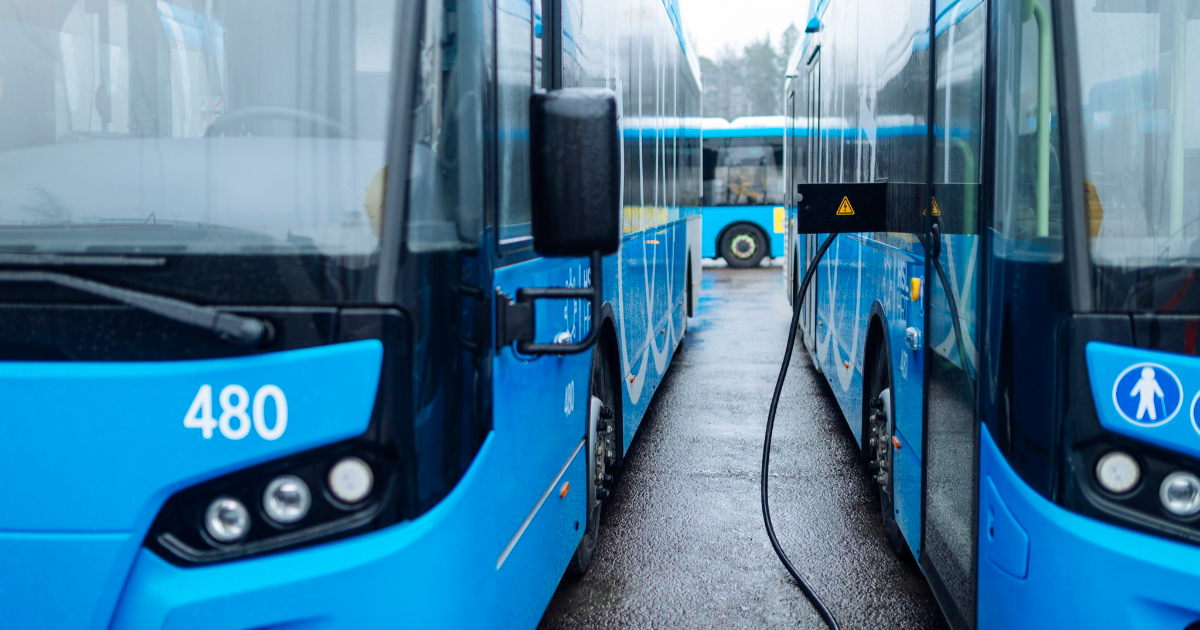New government proposal: public procurement of vehicles and transport services must be eco-friendly

The Government has proposed a new law that would increase the share of low- and zero-emission vehicles in the procurement of vehicles and transport services. The law would implement the requirements of the EU's Clean Vehicles Directive. The Government submitted its proposal to the Parliament on 29 April 2021.
For example, the scope of the new legislation would include the vehicles and transport services purchased by municipalities and the state, such as waste collection, local bus service and Kela transport. The law would help increase the use of alternative fuels such as electricity, gas and biofuels. If enacted, the law would replace the Act on Consideration for the Energy and Environmental Impact of Vehicles in Public Procurement. The law is one of the measures listed in the fossil-free transport roadmap draft.
"Public procurement must further emphasise low-emission vehicles and services. The law proposed by the Government is part of the fossil-free transport roadmap, which aims to halve transport emissions by 2030. This proposal puts the public sector at the forefront in reducing transport emissions," says Timo Harakka, Minister of Transport and Communications.
The proposal has been drawn up to account for fair treatment of the regions. For municipalities, the minimum share of environmentally friendly procurement has been specified based on distances and the regions' economic capabilities. In addition to the regulations required by the Directive, the law would apply to concession contracts for the procurement of vehicles and transport services. The Ministerial Working Group on Climate and Energy Policy has reviewed the content of the law, and the Finnish Council of Regulatory Impact Analysis issued their statement regarding the draft law in March.
Requirements for three vehicle categories
There are three vehicle categories for the minimum procurement requirements: passenger cars and light commercial vehicles, trucks, and buses. They apply to two procurement periods: 2 August 2021-2025 and 2026-2030. The requirements are used when a contracting entity purchases, rents, leases, hire-purchases or procures certain transport services. The Directive only applies to new procurements.
1. Passenger cars and light-duty vehicles - more electric vehicles
The first category includes passenger cars and light-duty vehicles, meaning vans, in this case N1 and M2 class vehicles.To be classified as environmentally friendly in accordance with the Directive, the CO2 emissions of passenger cars and vans may not exceed 50 g/km until the end of 2025, and they must be 0 g/km from 2026 onwards. In practice, this means fully electric vehicles, but plug-in hybrids are allowed until the end of 2025.
During both procurement periods, Finland must ensure that at least 38.5 per cent of procured passenger cars and vans are environmentally friendly. According to the proposal, municipalities in different regions would have different minimum share requirements for passenger cars, vans and trucks. This is based on the need to account for regional differences, such as distances, economic capability, the availability of recharging points and the local market for taxi services. Other contracting entities would be subject to the minimum requirements of the Directive.
2. Trucks - environmentally friendly vehicles running on biofuels, electricity, gas or hydrogen
Environmentally friendly trucks are vehicles that run on alternative fuels such as biofuel, electricity, gas or hydrogen. Finland must ensure that nine per cent of trucks procured in the first procurement period and 15 per cent of trucks procured in the second procurement period are environmentally friendly.
Like passenger cars and vans, the minimum requirements for municipal contracting entities would be scaled. This would mean stricter requirements for the contracting entities of municipalities in high-target regions compared to the contracting entities of municipalities in low-target regions. Other contracting entities would be subject to the minimum requirements of the Directive.
3. Buses - more fully electric buses
Environmentally friendly buses are vehicles that run on alternative fuels such as biofuel, electricity, gas or hydrogen. Finland must ensure that 41 per cent of buses procured in the first procurement period and 59 per cent of buses procured in the second procurement period are environmentally friendly. These requirements only apply to buses used for local transport, meaning buses having both seats and provision for standing passengers..
In addition, half of the environmentally friendly vehicles procured during both periods must be fully electric buses. This translates to 20.5 per cent in the first period and 29.5 per cent in the second period. The minimum targets for fully electric vehicles have been staggered to account for regional differences.
What falls outside the scope of the Directive?
The new legislation would not apply to long-distance buses, vehicles used for agriculture or forestry, or two- or three-wheeled vehicles. Emergency vehicles, military vehicles and vehicles used at construction sites would also be exempt. The requirements do not apply to M1 class vehicles intended for wheelchair users.
Next steps
A parliamentary debate will be conducted in a plenary session on the proposition submitted by the Government to the Parliament on 29 April 2021. The time of the debate will be announced on the Parliament's website. After the debate, the proposal will be sent for committee reading.
The law is planned to come into force in August 2021. The Directive's obligations enter into force on 2 August 2021. The new statutory requirements would apply to procurements where the procurement process starts after the law has been passed.
Further information:
Minister of Transport and Communications Timo Harakka. Direct interview requests to Communications Director Susanna Niinivaara, tel. +358 40 081 6187
Eleonoora Eilittä, Senior Officer, tel. +358 29 534 2089, eleonoora.eilitta(at)lvm.fi, Twitter @EleonooraE
Päivi Antikainen, Director of Unit, Ministry of Transport and Communications, tel. +358 50 382 7101, paivi.antikainen(at)lvm.fi, Twitter @PaiviAntikainen
Finnish Government plenary session working documents on 29 April 2021 (in Finnish)
Gateway to Information on Government Projects: Government proposal for an act on the procurement of clean and energy-efficient road transport vehicles (LVM051:00/2019) (in Finnish)
European Commission: Clean Vehicles Directive



